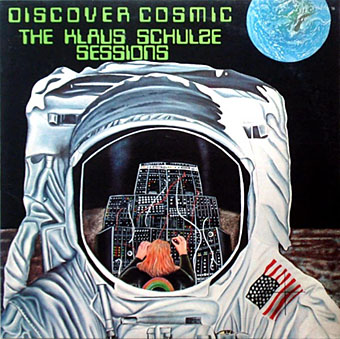A Moog on the Moon by P. Praquin, 1977. And a space helmet reflection to add to the list being accumulated by 70s Sci-Fi Art.
• RIP Klaus “Quadro” Schulze. I’ve owned many of his solo albums over the years, and while they’re historically important for the part they played in developing the kosmische sound in the 1970s I’ve never been very enthusiastic about the music. The albums I prefer are the ones where he was working with others, whether as a drummer in Ash Ra Tempel, an inadvertent member of the fake Cosmic Jokers supergroup, or part of the genuine Cosmic Couriers supergroup that made Tarot. The Tonwelle album credited to “Richard Wahnfried” benefits considerably from the presence of Manuel Göttsching and Michael Schrieve (also a rumoured Carlos Santana); I recommend it. For a taste of the synth-doodling Schulze, here he is in analogue heaven.
• Next month, Luminous Procuress, a film by Steven Arnold (previously), is released for the first time on blu-ray by Second Run: “Exploding out of San Francisco’s vibrant late-60s counter-culture, Luminous Procuress is a psychedelic odyssey of unabashed hedonism. The only feature film by artist, mystic and polymath Steven Arnold, the film celebrates gender-fluidity and pan-sexuality in a voyeuristic phantasmagorical journey towards spiritual ecstasy.”
• “Whereas [Bernard] Herrmann worked predominantly with strings and [John] Carpenter with synths, Anderson wanted to evoke a similar atmosphere with guitars.” Greg “The Lord” Anderson talks to Dan Franklin about making an album of night music.
I am troubled by how often people talk about likability when they talk about art.
I am troubled by how often our protagonists are supposed to live impeccable, sin-free lives, extolling the right virtues in the right order—when we, the audience, do not and never have, no matter what we perform for those around us.
I am troubled by the word “problematic,” mostly because of how fundamentally undescriptive it is. Tell me that something is xenophobic, condescending, clichéd, unspeakably stupid, or some other constellation of descriptors. Then I will decide whether I agree, based on the intersection of that thing with my particular set of values and aesthetics. But by saying it is problematic you are saying that it constitutes or presents a problem, to which my first instinct is to reply: I hope so.
Art is the realm of the problem. Art chews on problems, turns them over, examines them, breaks them open, breaks us open against them. Art contains a myriad of problems, dislocations, uncertainties. Doesn’t it? If not, then what?
Jen Silverman on the new moralisers
• “The website is colorful and anarchic, evoking the chaotic sensory experience of exploring a crammed, dusty shop.” Geeta Dayal explores the Syrian Cassette Archives.
• New music: The Last One, 1970 by Les Rallizes Dénudés; Untitled 3 by Final; Blinking In Time (full version) by Scanner.
• Why was erotic art so popular in ancient Pompeii? Meilan Solly investigates.
• You’ve been reframed: Anne Billson explores the history of split-screen cinema.
• At Spoon & Tamago: Japanese era names illustrated as logos.
• Mix of the week: XLR8R Podcast 745 by Wilted Woman.
• Fun type
• Split, Pt. 4 (1971) by The Groundhogs | Split Second Feeling (1981) by Cabaret Voltaire | Splitting The Atom (2010) by Massive Attack


Thanks for the 70s Sci-Fi Art shout out! That album cover is a great example of the trope, I’ll put it on my list to feature next week. Love your blog, keep up the great work!
Sorry to hear about Klaus Schulze. The problem with approaching Schulze’s solo work is that he seems to have insisted on releasing everything he ever recorded so I can imagine it would be difficult for someone unfamiliar with his work to find a way in. I would recommend a newbie to begin with two mid-70s highlights, BODY LOVE (ostensibly the soundtrack to a porno movie), and what I think is Schulze’s ambient electronic masterpiece, MIRAGE, which was composed while Schulze was processing his grief over the death of his brother.
Adam: My thanks to you for turning up so much neglected artwork.
Stephen: Yes, I like Mirage, it was one of the Schulze albums I used to have on vinyl. My problem with many of the other alleged classics is that too often they sound like what they were, improvisations by an ex-drummer trying to play keyboards. Too much aimless meandering, too many duff keyboard solos.
I’ve messed around with synthesizers enough to know that it’s very easy to create and maintain a “cosmic” atmosphere for 30 minutes; you can get away with that for one or two albums but doing it for album after album makes people wonder if you can do anything else. Mirage has a structure which many of the things that came before and after it lack.
I loved a few of the albums he worked as on – the lord Krishna Von goloka album and the far East family band albums – which have their own special feeling.
Yeah, the Sergius Golowin album is a strange one. I’ve had it on CD for years but still have no idea what the narration is saying.